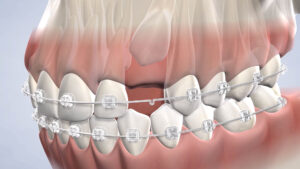 Impacted canine teeth require a team approach to ensure the tooth erupts and functions. We treat impacted canine teeth for patients of all ages to help you achieve a beautiful and healthy smile. If you or your child has an impacted tooth, contact us in Feasterville, Newtown, or Abington, PA. Dr. Michael Salin, Dr. Jared Weiner, Dr. Adam Semanoff, Dr. Bryan Nack, and Dr. Matt Kosakowski are board-certified oral surgeons and will create a custom care plan for you or your child’s unique needs.
Impacted canine teeth require a team approach to ensure the tooth erupts and functions. We treat impacted canine teeth for patients of all ages to help you achieve a beautiful and healthy smile. If you or your child has an impacted tooth, contact us in Feasterville, Newtown, or Abington, PA. Dr. Michael Salin, Dr. Jared Weiner, Dr. Adam Semanoff, Dr. Bryan Nack, and Dr. Matt Kosakowski are board-certified oral surgeons and will create a custom care plan for you or your child’s unique needs.
When a tooth is impacted, it means it is stuck under the gums and cannot erupt into the dental arch on its own. Wisdom teeth, or third molars, can become impacted, but because they are not necessary for oral function and can cause health issues, they are extracted. Canine teeth, however, are important for biting into food, guiding your bite, and maintaining alignment of your front teeth. When a canine tooth won’t erupt, every effort is made to save it and help guide it into its proper place.
If left untreated, impacted canines can cause issues such as:
An impacted tooth is susceptible to decay because it is difficult to clean. Once a cavity appears, decay can spread to neighboring teeth. You can prevent these issues by having an impacted canine tooth addressed as soon as possible.
Children should be evaluated by an orthodontist by the age of 7. Many orthodontic issues can be identified or prevented with early treatment, and impacted teeth are much easier to manage when detected early. There is not one perfect age for oral surgery, only the right age for you and your condition. Many patients who have an impacted canine begin wearing braces around the age of 10 and undergo the surgical procedure to expose the tooth shortly after, or around the early teens.
Adults can also undergo expose and bond treatment for an impacted canine tooth. We recommend early treatment during childhood because the teeth and jaws are still developing, which makes it easier to guide them into their proper positions.
Expose and bond treatment is a joint effort between your oral surgeon, who will expose the impacted tooth, and your orthodontist, who will use braces to guide it into place. To create your custom treatment plan, we will take 3D scans during the first visit. These images allow us to view the mouth and face from virtually any angle and plan out every detail of the procedure. We will also discuss your anesthesia options to ensure you or your child feels comfortable. Many patients undergo local anesthesia, laughing gas, or IV anesthesia for this procedure.
During the procedure, your oral surgeon will make an incision in the gum tissue to access the impacted tooth. Your surgeon will attach a bracket to the tooth, which has a gold chain attached to it. This chain attaches to the arch wire of the braces temporarily. You will visit your orthodontist shortly after this procedure, who will adjust the chain so that it uses force to gently pull the impacted tooth.
This process is gradual and may take up to a year to complete. However, by undergoing this procedure, we save the natural tooth and eliminate the need for extraction, as well as prevent many dental issues from arising that are caused by an impacted tooth.
Impacted canines may not always require surgery. If the tooth has not matured, we may give it time to see if it erupts on its own. If the tooth has matured, we may remove any intruding teeth or blockages preventing it from erupting. Your surgeon will design the right treatment plan for you or your child’s needs.
We offer a variety of choices to ensure a comfortable oral surgery experience.
Our board-certified oral surgeons manage impacted canines for patients of all ages. We have offices in Feasterville-Trevose, Newtown, and Abington, PA, and will work in harmony with your orthodontist to provide a seamless patient experience for you and your family. To schedule an evaluation for you or your child’s impacted canine tooth, contact Innovative Oral Surgery & Dental Implants today.
1300 Bridgetown Pike
Feasterville-Trevose, PA 19053
We Proudly Serve:
638 Newtown Yardley Rd #2A
Newtown, PA 18940
We Proudly Serve:
1494 Old York Road #2
Abington, PA 19001
We Proudly Serve:
For over 50 years, we have had the privilege of serving our communities with the highest level of oral surgery care. We love what we do, and we look forward to providing you and your loved ones with an outstanding patient experience and incredible results.
Administered through a syringe, a local anesthetic numbs only the surgical site. The effects can last up to several hours. We often pair local anesthesia with another type of anesthesia or sedation.
Commonly known as laughing gas, nitrous oxide is inhaled through a mask. It provides mild sedation and pain relief and is often combined with other options, such as oral sedation, for optimal effect.
General anesthesia will render you totally unconscious. This option is reserved for complex surgeries such as orthognathic surgery or facial reconstruction.
Your surgeon will inject the sedative into the vein, which will render you into a semi-conscious state. Also called twilight sedation or twilight dentistry, this option is ideal for extensive procedures or highly anxious patients.